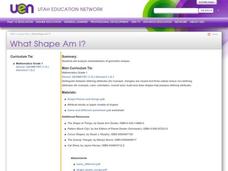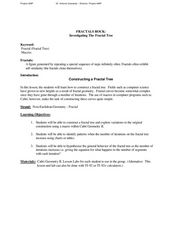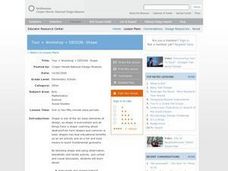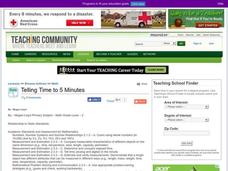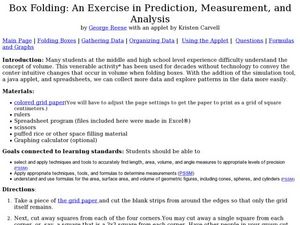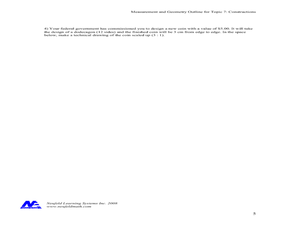Curated OER
What Shape Am I?
First graders analyze characteristics of geometric shapes. They identify, describe, and create simple geometric figures. They analyze characteristics of geometric shapes and determine the defining attributes of a circle,...
Pennsylvania Department of Education
Volume of Regular and Irregular Objects
Fifth graders examine patterns and relate to equations to solve math problems. In this patterns activity, 5th graders diagram, graph, use models and use tables to solve equations for real world problems.
Curated OER
Why is this lesson constructivist?
Students formulate a definition of tessellations by comparing and contrasting different patterns and shapes of real objects. They discuss the relatioship between shapes and patterns as well as their function in the real world. Students...
Pennsylvania Department of Education
Volume of Compound Figures
Fifth graders use patterns, models and relationships to solve equations. In this equations lesson plan, 5th graders define vocabulary for equations and complete worksheets explaining variables and solving problems.
Curated OER
Exploration Sequence of Bounces
New skills are developed as learners use graphing calculators and ranger technology to capture and graph the sequence of bounces a ball makes when dropped. After recording the height of four or more bounces, they use the collected data...
Curated OER
Fractals Rock
Students identify the repeated sequences of a pattern. In this geometry lesson plan, students identify fractals in patterns and nature. They construct a fractal tree and make conjectures.
Curated OER
Q Is For Quilt
In this letter Q worksheet, learners trace and practice examples of upper and lower case letter Qq. Students color a large quilt pattern and notice the geometric shapes.
Curated OER
Tessellations: Geometry and Symmetry
Students explore the concept of tessellations. In this tessellations lesson, students use an applet to construct tessellations. Students use regular polygons to construct tessellations. Students find patterns and symmetry in their...
Curated OER
Tour + Workshop = DESIGN: Shape
Ask elementary students to explore shapes in everyday objects. They will discuss the elements of design and describe the shapes they see in visual images. Students will then design and "build" a new 3D shape. Finally they will show and...
Curated OER
Investigation - Looking For Triangles
Seventh graders investigate a series of triangles, looking for patterns and generalizing what they have found. They analyze the pattern data and organize it into a table and graph. Students identify the relationship and discover the rule...
Curated OER
Same As
Explore the concept of the equals symbol. In this mathematical symbols lesson, learners discover the meaning of the equals sign (symbol). They also construct addition and subtraction sentences to understand the concept of equal parts.
Curated OER
Telling Time to 5 Minutes
In this second grade lesson your class will practice telling time. The goal is to tell time to five minutes using an analog clock. Your young students count by 5 minute intervals and discuss elapsed time.
Curated OER
Snowflake Curve
Students develop an appreciation for complex structures in nature. They observe patterns in nature in relationship to the Real World. Students use observation skills to assist in problem solving. They show comprehension of the concepts...
Curated OER
Inquiry Cube
Fifth graders investigate geometric shapes. In this geometry lesson, 5th graders classify and group shapes and patterns by likeness. They investigate patterns based on clues from their peers.
Curated OER
Pizza Topping Combinations
Learners brainstorm pizza toppings and determine the number of possible ways to order a pizza. For this algebra lesson, students analyze and investigate geometric patterns as they relate to the concept of a variable. Learners then...
Curated OER
Box Folding: Predict, Analyze and Measure
Students predict the shape of a geometric figure in 3D. In this geometry instructional activity, students construct 3D shapes to perfect their knowledge of measuring and predicting. This assignment is also available as an online...
Curated OER
Design Your Own Quilt Pattern
Students apply what they have learned, from Eight Hands Round a Patchwork Alphabet, about how quilt blocks got their names by constructing and naming a quilt block pattern of their own using pattern blocks and pattern block paper.
Curated OER
Perimeters, Patterns, and Conjectures
Students discover patterns and write conjectures relating to perimeters and polygons. Working in cooperative learning groups, they use manipulatives and graphic organizers to solve problems then answer a series of questions in which they...
Curated OER
Constructing Geometric Shapes
In this construction geometric shapes worksheet, student use the software program for instruction then construction shapes and bisect angles for four questions.
EngageNY
Recursive Formulas for Sequences
Provide Algebra I learners with a logical approach to making connections between the types of sequences and formulas with a lesson that uses what class members know about explicit formulas to develop an understanding of...
Curated OER
Try Tessellation
Most middle schoolers probably feel that quilting is at best an activity left to their grandmothers. This lesson uses the Zome modeling system to get them to realize how shapes in quilting are really tessellations and repeating patterns....
Curated OER
Shaping Up!
Kindergartners are introduced to basic shapes. Learners spend 45 minutes a day in geometry centers carrying out the activities outlined in this ambitious plan. There are games, hands-on activities, interactive websites, art projects,...
Curated OER
A Honey of a Hexagon
Learners explore how bees make honey and why the hexagon is the best basic pattern for the honeycomb through the use of a video and hands-on activities with honeycombs and geometric shapes.
Curated OER
ExplorA-Pond:3rd Grade Shapes & Fractions
Students, using a map, drawing or aerial view of a pond, represent the shape of the pond using simple geometric shapes or fractions of those shapes. They identify the numerator and denominator in each fraction created.
